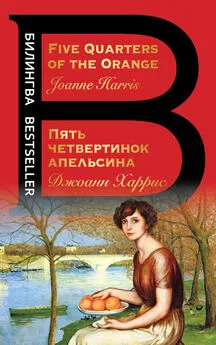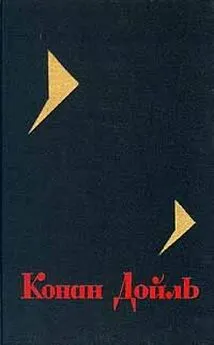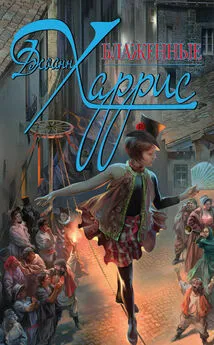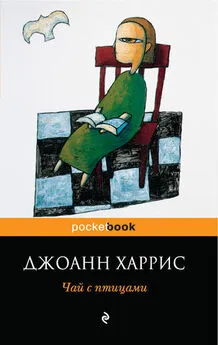Джоанн Харрис - Five Quarters of the Orange / Пять четвертинок апельсина
- Название:Five Quarters of the Orange / Пять четвертинок апельсина
- Автор:
- Жанр:
- Издательство:неизвестно
- Год:2022
- Город:Москва
- ISBN:978-5-04-163417-9
- Рейтинг:
- Избранное:Добавить в избранное
-
Отзывы:
-
Ваша оценка:
Джоанн Харрис - Five Quarters of the Orange / Пять четвертинок апельсина краткое содержание
Оригинальный текст и перевод на страницах одной книги – это эффективный способ усовершенствовать знание английского языка.
От матери в наследство Фрамбуаза получила альбом с кулинарными рецептами – негусто, если учесть, что ее брату Кассису досталась ферма, а старшей сестре Рен-Клод – винный погреб со всем содержимым. Но весь фокус в том, что на полях альбома, рядом с рецептами разных блюд и травяных снадобий, мать записывала свои мысли и признания относительно некоторых событий ее жизни – словом, вела своеобразный дневник. И в этом дневнике Фрамбуаза пытается найти ответы на мрачные загадки прошлого.
«Харрис создала многослойный сюжет, усыпанный восхитительными описаниями французских книг и раскрывающий встряхивающий эффект войны на хрупкое семейное устройство». – Publishers Weekly
«Из ее книг эта – пока самая сильная: острая, с горчинкой…» – Independent
В формате PDF A4 сохранен издательский макет.
Five Quarters of the Orange / Пять четвертинок апельсина - читать онлайн бесплатно ознакомительный отрывок
Интервал:
Закладка:
And what about those old men-eighty, ninety, some of them-locked away for war crimes? Blind old men, sick old men sweetened by dementia, their faces slack and uncomprehending. Impossible to believe that they might once have been young. Impossible to imagine bloody dreams inside those fragile, forgetful skulls. Smash the vessel, the essence evades you. The crime takes on a life-a justification-of its own.
“By a strange coincidence, the owner of Crêpe Framboise, Mme. Françoise Simon, just happens to be related to the owner of Aux Délices Dessanges…”
My breath stopped. I felt as if a flake of fire had blocked my windpipe and suddenly I was underwater, brown river clutching me under, fingers of flame reaching into my throat, my lungs…
“…our very own Laure Dessanges! Strange to say that she hasn’t managed to find out many of her aunt’s secrets. I for one much preferred the unpretentious charm of Crêpe Framboise to any of Laure’s elegant (but all too meager!) offerings.”
I breathed again. Not the nephew, but the niece. I had escaped discovery.
I promised myself then that there would be no more foolishness. No more talking to kind food writers. A photographer from another Paris magazine came to interview me a week later, but I refused to see him. Requests for interviews came by the post, but I left them unanswered. A publisher wrote to me with an offer to write a book of recipes. For the first time Crêpe Framboise was deluged by people from Angers, by tourists, by elegant people with flashy new cars. I turned them away by the dozen. I had my regulars, my ten to fifteen tables. I could not accommodate so many people.
I tried to behave as normally as I could. I refused to take advance bookings. People queued on the pavement. I had to engage another waitress, but otherwise I ignored the unwelcome attention. Even when the little food writer returned to argue-to reason with me-I would not listen to him. No, I would not allow him to use my recipes in his column. No, there was to be no book. No pictures. Crêpe Framboise would stay as it was, a provincial crêperie.
I knew that if I stonewalled for long enough they would leave me alone. But by that time the damage was done. Now Laure and Yannick knew where to find me.
Cassis must have told them. He had settled in a flat near the center of Paris, and though he had never been a good correspondent he wrote to me occasionally. His letters were filled with reports of his famous daughter-in-law, his fine son. Well, after the article and the stir it caused, they made it their business to find me. They brought Cassis with them, like a present. They seemed to think we would be moved, somehow, at seeing each other again after so many years, but though his eyes watered in a rheumy, sentimental sort of way, mine stayed resolutely dry. There was hardly a trace of the older brother with whom I had shared so much; he was fat now, his features lost in a shapeless dough, his nose reddened, his cheeks crack-glazed with broken veins, his smile vacillating. In place of what I once felt for him-the hero worship of the big brother who in my mind could do anything, climb the highest tree, brave wild bees to steal their honey, swim right across the Loire at its broadest point-there was nothing but a faint nostalgia colored with contempt. All that was such a long time ago, after all. The fat man at the door was a stranger.
At first they were clever. They asked for nothing. They were concerned for me living alone, gave me presents-a food processor, shocked that I didn’t already have one, a winter coat, a radio-offered to take me out… Even invited me to their restaurant once, a big barn of a place with gingham-print faux-marble tables and neon signs and dried starfish and brightly colored plastic crabs wreathed in fisherman’s netting on the walls. I commented, rather diffidently, on the décor.
“Well, Mamie, it’s what you’d call kitsch,” explained Laure kindly, patting my hand. “I don’t suppose you’re interested in things like that, but believe me, in Paris, this is very fashionable.”
She leveled her teeth at me. She has very white, very large teeth, and her hair is the color of fresh paprika. She and Yannick often touch and kiss each other in public. I have to say it all rather embarrassed me. The meal was… modern, I suppose. I’m no judge of such things. Some kind of salad in a bland dressing, lots of little vegetables cut to look like flowers. Might have been some endive in there, but mostly just plain old lettuce leaves and radishes and carrots in fancy shapes. Then a piece of hake (a nice piece, I have to say, but very small) with a white wine shallot sauce and a piece of mint on top-don’t ask me why. Then a sliver of pear tartlet fussed over with chocolate sauce, dusted sugar, chocolate curls. Looking furtively at the menu, I noticed a great deal of self-congratulatory stuff along the line of “a nougatine of assorted candies on a mouthwatering bed of wafer-thin pastry, bound with thick dark chocolate and served with a tangy apricot coulis.” Sounded like a plain old florentine to me, and when I saw it, it looked no bigger than a five-franc piece. You’d have thought Moses brought it down from the mountain, to read what they’d put about it. And the prices! Five times the price of my most expensive menu, and that was without the wine. Course, I didn’t pay for any of it. But I was beginning to think that all the same, there might be a hidden price in all this sudden attention.
There was.
Two months later came the first proposal. A thousand francs to me if I would give them my recipe for paëlla antillaise and allow them to put it on their menu. Mamie Framboise’s paëlla antillaise, as mentioned in Hôte amp; Cuisine (July 1992) by Jules Lemarchand. At first I thought it was a joke. A delicate blend of freshly caught seafood subtly melded with green bananas, pineapple, muscatels and saffron rice… I laughed. Didn’t they have enough recipes of their own?
“Don’t laugh, Mamie.” Yannick was almost curt, his bright black eyes very close to mine. “I mean, Laure and I would be so grateful…”
He gave a wide, open smile.
“Now don’t be coy, Mamie.” I wished they wouldn’t call me that. Laure put her cool bare arm around me. “I’d make sure everyone knew it was your recipe.”
I relented. I don’t actually mind giving out my recipes; after all, I’ve given enough out already to people in Les Laveuses. I’d give them the paëlla antillaise for nothing, plus anything else they took a shine to, but on condition that they left Mamie Framboise off the menu. I’d had one narrow escape. I wasn’t going to court more attention.
They agreed so quickly to my demands and with so little argument. And three weeks later the recipe for Mamie Framboise’s paëlla antillaise appeared in Hôte amp; Cuisine, flanked by a gushing article by Laure Dessanges. “I hope to be able to bring you more of Mamie Framboise’s country recipes soon,” she promised. “Till then, you can taste them for yourself at Aux Délices Dessanges, Rue des Romarins, Angers.”
I suppose they never imagined that I would actually read the article. Perhaps they thought that I hadn’t meant what I’d told them. When I spoke to them about it they were apologetic, like children caught out in some endearing prank. The dish was already proving extremely successful, and there were plans for an entire Mamie Framboise section of the menu, including my couscous à la provençale, my cassoulet trois haricots and Mamie’s Famous Pancakes.
“You see, Mamie,” explained Yannick winningly. “The beauty of it is that we’re not even expecting you to do anything. Just to be yourself. To be natural.”
“I could run a column in the magazine,” added Laure. “”Mamie Framboise Advises,“ something like that. Of course, you wouldn’t need to write it. I’d do all that.”
She beamed at me, as if I were some child who needed reassurance.
They’d brought Cassis with them again, and he too was beaming, though he looked confused, as if this was all a little too much for him.
“But I told you.” I kept my voice level, hard, to keep it from trembling. “I told you before. I don’t want any of this. I don’t want to be a part of it.”
Cassis looked at me, bewildered.
“But it’s such a good chance for my son,” he pleaded. “Think what the publicity might do for him.”
Yannick coughed.
“What my father means,” he amended hastily, “is that we could all benefit from the situation. The possibilities are endless if the thing catches on. We could market Mamie Framboise jams, Mamie Framboise biscuits… Of course, Mamie, you’d have a substantial percentage…”
I shook my head.
“You’re not listening,” I said in a louder voice. “I don’t want publicity. I don’t want a percentage. I’m not interested.”
Yannick and Laure exchanged glances.
“And if you’re thinking what I think you’re thinking,” I said sharply, “that you might just as easily do it without my consent-after all, a name and a photograph’s all you really need-then listen to this. If I hear of one more so-called Mamie Framboise recipe appearing in that magazine-in any magazine-then I’ll be on the phone to the editor of that magazine that very day. I’ll sell him the rights to every recipe I’ve got. Hell, I’ll give them to him for free.”
I was out of breath, my heart hammering with rage and fear. But no one railroads Mirabelle Dartigen’s daughter. They knew I meant what I said too. I could see it in their faces.
Helplessly, they protested:
“Mamie-”
“And stop calling me Mamie!”
“Let me talk to her.” That was Cassis, rising with difficulty from his chair.
I noticed that age had shrunk him; had softly sunk him into himself, like a failed soufflé. Even that small effort caused him to wheeze painfully.
“In the garden.”
Sitting on a fallen tree trunk beside the disused well I felt an odd sense of doubling, as if the old Cassis might pull aside the fat-man’s mask from his face and reappear as before, intense, reckless and wild.
“Why are you doing this, Boise?” he demanded. “Is it because of me?
I shook my head slowly.
“This has nothing to do with you,” I told him. “Or Yannick.” I jerked my head at the farmhouse. “You notice I managed to get the old farm fixed up.”
He shrugged.
“Never saw why you’d want to, myself,” he said. “I wouldn’t touch the place. Gives me the shivers just to think of you living here.” Then he gave me a strange look, knowing, almost sharp. “But it’s very like you to do it.” He smiled. “You always were her favorite, Boise. You even look like her nowadays.”
I shrugged.
“You won’t talk me round,” I said flatly.
“Now you’re beginning to sound like her too.” His voice, complex with love, guilt, hate. “ Boise…”
I looked at him.
“Someone had to remember her,” I told him. “And I knew it wasn’t going to be you.”
He made a helpless gesture.
“But here, in Les Laveuses…”
“No one knows who I am,” I said. “No one makes the connection.” I grinned suddenly. “You know, Cassis, to most people, all old ladies look pretty much the same.”
He nodded.
“And you think Mamie Framboise would change that.”
“I know it would.”
A silence.
“You always were a good liar,” he observed casually. “That’s another thing you got from her. The capacity to hide. Me, I’m wide open.”
He flung his arms wide to illustrate.
“Good for you,” I said indifferently. He even believed it himself.
Читать дальшеИнтервал:
Закладка:









